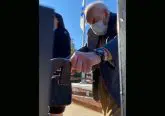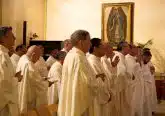Bishop Paprocki explores link between physical and spiritual fitness in new book
by Jonah McKeown
Denver Newsroom, Apr 5, 2021 / 04:16 am MT (CNA).- Bishop Thomas Paprocki of Springfield, Illinois doesn’t generally introduce himself as a runner. His first love is hockey, which, at nearly 70 years old, he still plays regularly. He even coaches the goalkeepers at a local Catholic high school.
“I’m still playing hockey, and I attribute that to my running,” Paprocki told CNA.
Paprocki wasn’t a born runner. In fact, the first time he tried to “go on a run,” he kind of hated it.
But he pressed on, and the reason was simple. Three of his grandparents died in their 50s from heart disease, and Paprocki realized a similar fate may be waiting for him if he didn’t improve his health.
“I was reading about the cardiovascular benefits of aerobic training, running, biking or swimming, and so I thought, ‘If I want to live past 55 I better take up something,’ so I took up running,” he said.
All told, since that day, Bishop Paprocki has run 24 marathons and counting. He’s also raised over half a million dollars for charity in the process.
Paprocki recently wrote a book called “Running for a higher purpose: 8 Steps to Spiritual and Physical Fitness,” (Ave Maria Press) which released March 26.
In it, he offers expert advice on running from a practical standpoint, while interweaving lessons on how to grow in one’s spiritual life.
“One of the main premises of the book is the connection between body and soul. Unlike the ancient Greek philosophers who kind of saw the body as something that was discarded at death and you wouldn’t need it anymore…We believe in the resurrection of the body, that our bodies will be raised up when our Lord comes again at the second coming, so we are to treat our bodies with respect,” Paprocki said.
“The way I wrote this book was to keep that connection, so it’s not like one chapter is about the spiritual life and the other chapter is about training to run. They’re interwoven because, I think, most runners will tell you, especially marathon runners, that you need some deep spiritual resources in order to do a marathon.”
The practical steps that Paprocki lays out in the book begin with recommending an honest assessment of one’s physical fitness and health.
“Once you identify where you need to improve, you have to figure out what you are going to do about that,” he said.
An honest assessment of one’s spiritual health is not dissimilar, he said. A spiritual director can help with this.
“It is a little more difficult to assess your spiritual fitness than it is your physical fitness. Your physical fitness, you have measurements, like how much you weigh, what’s your blood pressure, what’s your cholesterol, things like that, but even for that, we go to a doctor. We go for a physical and we have somebody check us out. That’s where I think spiritual directors can also be helpful, because it’s a little more difficult to quantify that,” Paprocki said.
“‘How holy am I?’ Well, only God knows, in a sense, how we’re growing in our holiness, but your spiritual director can help guide you in terms of making progress.”
Like with physical fitness, different people are going to be at different places in their spiritual life, and will measure their success differently.
“If you’re not praying regularly, just start out with a morning offering or say grace before your meals. If you’re not used to saying the Rosary, just start with a decade – 10 Hail Marys – and work your way up to saying a full Rosary,” he suggested.
Spiritual health, like physical health, takes repeated effort and a daily commitment, Paprocki said.
“You can’t go to Mass once and say, ‘Okay, I’m good. I went to Mass.’ We have to go to Mass every week, every Sunday. Confession, too…we have to do that frequently,” he noted.













